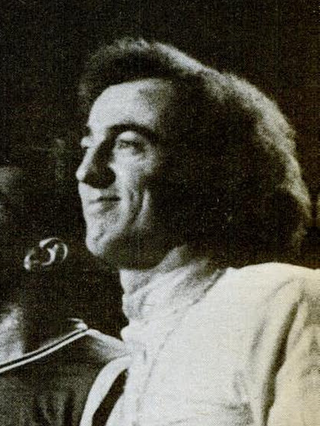
Richard Quentin Laird was an Irish musician, best known as the bassist and a founding member of the jazz fusion band Mahavishnu Orchestra, with which he performed from 1971 to 1973.

Astral Weeks is the second studio album by Northern Irish singer-songwriter Van Morrison. It was recorded at Century Sound Studios in New York during September and October 1968, and released in November of the same year by Warner Bros. Records.

Frederick Dewayne Hubbard was an American jazz trumpeter. He played bebop, hard bop, and post-bop styles from the early 1960s onwards. His unmistakable and influential tone contributed to new perspectives for modern jazz and bebop.

Elvin Ray Jones was an American jazz drummer of the post-bop era. Most famously a member of John Coltrane's quartet, with whom he recorded from late 1960 to late 1965, Jones appeared on such albums as My Favorite Things, A Love Supreme, Ascension and Live at Birdland. After 1966, Jones led his own trio, and later larger groups under the name The Elvin Jones Jazz Machine. His brothers Hank and Thad were also celebrated jazz musicians with whom he occasionally recorded. Elvin was inducted into the Modern Drummer Hall of Fame in 1995. In his The History of Jazz, jazz historian and critic Ted Gioia calls Jones "one of the most influential drummers in the history of jazz". He was also ranked at Number 23 on Rolling Stone magazine's "100 Greatest Drummers of All Time".

Cecil McBee is an American jazz bassist. He has recorded as a leader only a handful of times since the 1970s, but has contributed as a sideman to a number of classic jazz albums.
Arthur David Davis was a double-bassist, known for his work with Thelonious Monk, John Coltrane, Dizzy Gillespie, McCoy Tyner and Max Roach.
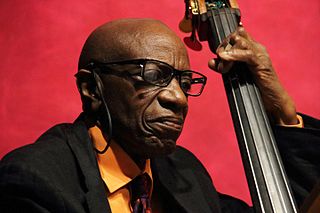
Reginald Workman is an American avant-garde jazz and hard bop double bassist, recognized for his work with both John Coltrane and Art Blakey, in addition to Alice Coltrane, Mal Waldron, Max Roach, Archie Shepp, Trio Three, Trio Transition, the Reggie Workman Ensemble, and collaborative projects with dance, poetry and drama.

George Edward Coleman is an American jazz saxophonist known for his work with Miles Davis and Herbie Hancock in the 1960s. In 2015, he was named an NEA Jazz Master.
Wilbur Bernard Ware was an American jazz double bassist. He was a regular bassist for the Riverside record label in the 1950s, and recorded regularly in that decade with Johnny Griffin, Kenny Dorham, Kenny Drew, and Thelonious Monk. He also appeared on records released by J.R. Monterose, Toots Thielemans, Sonny Clark, Tina Brooks, Zoot Sims, and Grant Green, among others.

Frank Benjamin Foster III was an American tenor and soprano saxophonist, flautist, arranger, and composer. Foster collaborated frequently with Count Basie and worked as a bandleader from the early 1950s. In 1998, Howard University awarded Frank Foster with the Benny Golson Jazz Master Award.

Clifford Laconia Jordan was an American jazz tenor saxophone player and composer. Originally from Chicago, Jordan later moved to New York City, where he recorded extensively in addition to touring across both Europe and Africa. He recorded and performed with Art Farmer, Horace Silver, Max Roach, J.J. Johnson, and Kenny Dorham, among others. In later years, performed with Cedar Walton's quartet Eastern Rebellion, and led his own groups, including a big band.
"The Way Young Lovers Do" is a song by Northern Irish singer-songwriter Van Morrison from his second solo album, Astral Weeks. It was recorded in 1968, at Century Sound Studios New York City, during September and October of that year. The song is in triple metre. The distinctive feel of the original recording emerges from the non-rock style of double-bass phrasing by veteran jazzman Richard Davis and additional jazz musician session players, which combined with Morrison's soulful vocals, creates a relatively unusual combination of stylistic elements.

Albert Preston Dailey was an American jazz pianist.
George Andrew Tucker was an American jazz double-bassist.
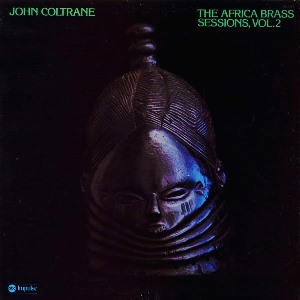
The Africa/Brass Sessions, Vol. 2 is a posthumous compilation album by American jazz saxophonist and composer John Coltrane, released in 1974 by Impulse Records. It compiles outtakes from the same 1961 sessions that produced his Africa/Brass album. "Song of the Underground Railroad" and "Greensleeves" were recorded on May 23, while "Africa" was recorded on June 4. On October 10, 1995, Impulse incorporated the tracks issued here into a two-disc set entitled The Complete Africa/Brass Sessions.
Andrew G. McKee is a New York-based, American bassist who has been performing and recording in North America, South America, Europe, and Japan since 1978. McKee's most important rhythm section mentors have included Philly Joe Jones, Elvin Jones and Idris Muhammad. He travelled widely in Europe with both Elvin Jones and with French pianist Michel Petrucciani. He played for about a decade with the Mingus Big Band and has had his own groups. He is the author of two books on upright bass technique and has taught at The New School for Jazz and Contemporary Music since 1993.
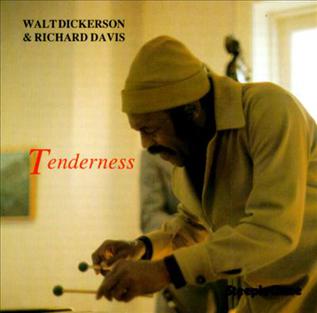
Tenderness is an album of duets by vibraphonist Walt Dickerson and bassist Richard Davis recorded in 1977 for the SteepleChase label but not released until 1985.
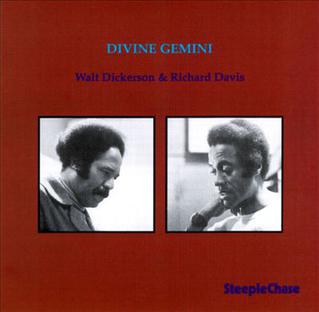
Divine Gemini is an album of duets by vibraphonist Walt Dickerson and bassist Richard Davis, recorded in 1977 for the SteepleChase label.
This is the discography for American jazz musician Richard Davis.
Lisle Arthur Atkinson was an American jazz double-bassist.













